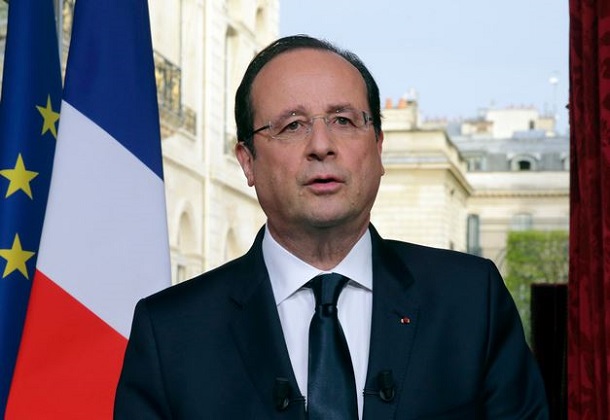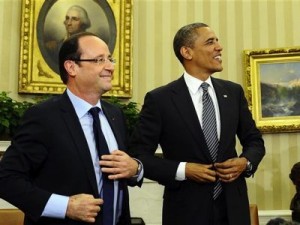US Espionage on France’s Highest Government Officials: The Tolerable Deception?

On June 23, WikiLeaks released various documents of the National Security Agency’s “Espionnage Elyseé” program revealing another diplomatic known: that the agency had been keeping an eye on the highest French government officials, among them three French Presidents.
The release of such material is providing a wealth of material for the student, less of international relations and intelligence communities per se – we know that the NSA’s main purpose is to spy on leaders and their state apparatuses – as the relations of a specific form of state behaviour. Anthropologists of the world wake up – there is much to be find here.At work seems to be a certain rehearsed choreography. First come the revelations – in this case, nothing too stunning: the fear by current French president François Hollande over a possible Grexit as far back as 2012; Nicolas Sarkozy toying with the idea that France would go it alone without US involvement in restarting the Israeli-Palestinian peace talks and records of summaries on ties between the administrations of Hollande and Germany’s Angela Merkel.
One of the NSA reports from 2008 even has a jab at Sarkozy’s buffoonery. The title is self-explanatory: “Sarkozy Sees Himself as Only One Who Can Resolve World Financial Crisis.” But as The Economist also notes, others are more sensitive, including the concealed meeting between Hollande and the German opposition over the consequences of Greece leaving the Eurozone.[1] This, it is claimed, took place without the knowledge of Chancellor Merkel.Presidents express rage; those found out express sorrow and promise correction. Structural change never takes place – the relationship is as it is, and the comments about the relevant alliance continue in their necessary disingenuousness. This qualifies as a form of courtship, and it is one that proves mistrustful, layered with presumptions and its little deceptions.

Details of an emergency meeting involving the cabinet and members of the army are then released, this time taking place on June 24. “France,” proclaims Hollande, “will not tolerate actions that threaten its security and protection of its interests.”
France may not officially tolerate such threats but it all comes down to a matter of degree. The issue has been an ongoing one. In March 2010, it was a known sticking point in negotiations between French President Nicolas Sarkozy and his US counterparts in attempts to negotiate a bilateral intelligence agreement. Everyone in such circles knew that the other was peering over the fence, and more to the point, having a good rummage in the paddock.
As with the role played by the Merkel hacking case regarding German-US relations, President Barack Obama knows what to do: placate, reassure and perhaps keep up the appearances of deception for the audience of his aggrieved ally. There may even be sympathetic ears in the French intelligence community – after all, in the NSA-German hacking scandal, it was clear that the BND intelligence service was more than just knee deep with its NSA counterpart. Merkel has put on a brave, even foolish face at stages – there was much to do that requires both countries. Relations could not be ruptured. Then there was the reassurance by her Chief of Staff Ronald Pofalla in August 2013: the NSA’s activities were doing “nothing that damaged German interests.”[2] The strategy was one of silence and technical cumbersomeness; in the words of Spiegel Online (May 14), “it’s all terribly technical and not all that important, really.”
The same thing went for Brazil’s Dilma Rousseff, who underwent an even more dramatic transformation in her response to the NSA’s actions. On addressing journalists after meeting Obama at the Summit of the Americas in Panama City in April, the Brazilian president seemed suspiciously confident. A meeting in Washington was scheduled for June 30. Journalist Patricia Campos Mello wondered with some curiosity whether “this planned visit mean[s] that the NSA spying episode is entirely overcome”.[3]
The response was tepid. “It means we recognise the action taken by the US… that friendly countries won’t be spied upon. And we have a declaration from President Obama. When he wants to know something, he’ll call me.” Who, in this equation, is beguiling or proving gullible? The Brazilian leader had well and truly emerged from the chrysalis of criticism of NSA practices, which had involved, not merely a concerted targeting of her communications, but the country’s national oil company Petrobas.
 The same recipe is found in the French-NSA cooking mix. In a phone call to Hollande, Obama reiterated Washington’s commitment to end such “unacceptable” practices. Hollande’s office duly explained how, “President Obama reiterated unequivocally his firm commitment… to end the practices that may have happened in the past and that are considered unacceptable among allies.”[4]
The same recipe is found in the French-NSA cooking mix. In a phone call to Hollande, Obama reiterated Washington’s commitment to end such “unacceptable” practices. Hollande’s office duly explained how, “President Obama reiterated unequivocally his firm commitment… to end the practices that may have happened in the past and that are considered unacceptable among allies.”[4]
From Washington’s side, there has been a notable absence to mention any actual change to the espionage practices behind spying on its allies. The USA Freedom Act may have crept onto the books, but the practice continues with unstinting indifference. Deem it unacceptable in statements, and even deny it, by all means, but do little about it. “Such statements,” suggests Anhvinh Doanvo, “will prove to be counterproductive as the NSA continues to throw away its credibility with media reports continually contradicting its narrative.”[5]
Government spokesman Stephane Le Foll has emphasised that the French will “verify that this spying has finished” – a tall order indeed. None of this bluster suggests that the revelations, in themselves, will necessarily reform attitudes that are accepted and deemed acceptable behind closed doors.
Dr. Binoy Kampmark was a Commonwealth Scholar at Selwyn College, Cambridge. He lectures at RMIT University, Melbourne. Email:[email protected]
Notes
[1] http://www.economist.com/news/
[2] http://www.spiegel.de/
[3] http://foreignpolicy.com/2015/
[4] http://www.reuters.com/
[5] http://thehill.com/blogs/

